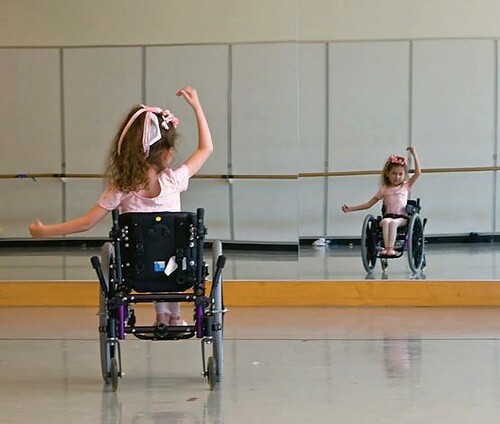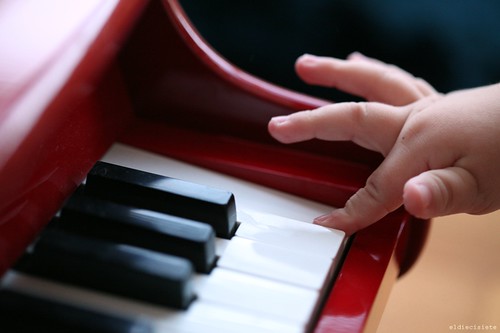Become a Kindermusik Educator.
Thursday, April 26, 2012
Friday, April 20, 2012
The little red piano - El pequeño piano rojo
What draws us to play, or to love hearing, some instruments above all others?
Why are 40m children in China learning the piano, a European instrument that has scant connection with Eastern culture?
What accounts for the guitar’s dominance in Western popular music?
Why do composers express their most melancholy thoughts on cellos?
These questions go beyond music. They touch on the essence of identity, aspiration, expression, history and politics, as well as what Jung called our collective unconscious…
How you interpret any sound depends on its context and your knowledge.
More Intelligent Life asks, “Which is the best music instrument?”
Also see this vintage guide to how to listen to music and a neuroscientist’s debunking of the myth of a "music instinct.”
via ex.plore
Tuesday, April 17, 2012
The inspired story of the Kimbanguiste Symphony Orchestra, the only symphony orchestra in Central Africa, which practices in a rented warehouse in the Congo and got its start with no instruments and no professional musicians who knew how to read music – a wonderful addition to other recent innovation in orchestras.
via exp.lore.com
We can teach music anywhere. Call today and talk us about all the wonderful places we're teaching Kindermusik around the globe - and hopefully soon, in your hometown!
via exp.lore.com
We can teach music anywhere. Call today and talk us about all the wonderful places we're teaching Kindermusik around the globe - and hopefully soon, in your hometown!
Tuesday, April 10, 2012
Adventure Ahead! Snacks, crafts, activities, and summer!
 |
| "Our first Kindermusik homework assignment is to make some paper tube binoculars and go exploring. " |
Love what this parent says about the unique relationship between a child and craft time.
"My friend Courtney has a theory when it comes to doing activities with your child - There is an inverse relationship between the amount of time and effort you put into making something with your child and the amount of actual enjoyment by your child.
When you spend hours lingering over the perfect craft or activity with your child, they drop it in 2 minutes, never to return to it.
When you slap something together in 30 seconds with no thought or skill associated with it, you can guarantee that your child will love it. This explains the success of these very low-tech binoculars." - Gardening Without Skills
We agree. That's mostly because if it's easy enough for the two of you to do together, your child will love it even more.
That's why we created Kindermusik Adventures.
As an Educator, you'll love teaching these camps. And your families will love the easy activities, tested again and again by children in Kindermusik classes around the country!
- The semester is shorter, about 5 sessions long (you can extend the semester or supplement activities if you choose).
- Choose from developmentally appropriate themes for children ages newborn to 7 years.
- Each class is an integrated experience, from the stories and songs to the summer time snacks (polar bear ice cream!)
And the take home class activities are specifically designed for summer - such as making your own binoculars at home and spending the day simply exploring the neighborhood.
If you're just beginning Kindermusik training, you'll learn more about summer camps in your online training class.
Get ready for an Adventure!
Saturday, April 7, 2012
Math students in California start with the basics: Music Education
"Math teachers know that fractions can be hard for the average third-grader. Teachers at a public school in San Bruno, Calif., just south of San Francisco, are trying something new. They're teaching difficult math concepts through music, and they're getting remarkable results."
npr.org: Fractions curriculum in Fractions Curriculum Strikes the Right Note with Students.To learn more about teaching early concepts of music and notation to young children, ask about the Young Child program in Kindermusik Training.
Age range: 5 to 7 years old
Class length: 60-70 minutes
Children learn to play three basic instruments - a stringed, wind, and keyboard instrument - along with early concepts of music and notation.
Using a small-group approach to music education, Kindermusik for the Young Child provides a pressure-free class where your child can develop a strong musical foundation by learning the concepts, language, notation, and vocabulary of music and its greatest composers.
The program is designed to prepare the young child who is eager for first experiences with musical symbols and instrument discovery but is not yet ready for formal lessons and traditional music reading with an instrument. Parents or caregivers are encouraged to attend the last 10-15 minutes of class.
Friday, April 6, 2012
Alive Inside: The Story of Music and Memory
Alive Inside Trailer from Michael Rossato-Bennett on Vimeo.
A new documentary on the effects of music on Alzheimer's patients is showing this month at the Rubin Museum of Art in New York City. Screening dates are Wednesday, April 18th through Saturday, April 21st. More information about the project can be found on the Rubin Museum website.
If you're reading this blog, you're probably a musician. A music educator. Perhaps you're a music therapist. And you've probably seen or experienced a few of the things from this video: Seemingly unresponsive people who light up when they hear music.
In the early 2000s, as scientists started capturing images of the musical effect on the mind, there was a surge of research and reports on what was eventually coined the "Mozart Effect."
But it's not just Mozart that can affect the mind. It's Cab Calloway. Doris Day. Ray Henderson. The California Ramblers.
Recently I was asked to play a friend's party. I needed a set list full of those tunes.
It was a friend's "going away" party. She was a resident in a local nursing home here in Greensboro, NC. Her doctors recently told her that her cancer diagnosis was terminal. But at 90-some years old, she wasn't about to go out quietly.
She threw a going away party.
Over 100 people, friends, a few daughters and grand-daughters gathered around her. I stood in the corner, playing a few songs that might lift some of the heaviness in the room. "Que Sera, Sera," was a natural pick.
But the Rabbi stole the show.
When the family's Rabbi asked to borrow my guitar he stood in the center of the room and banged out one of the most rousing versions of "5 Foot 2, Eyes of Blue," I've ever heard. And soon people were clapping, singing, dancing. For 3 minutes. We forgot why we there.
As musicians, we know the power of music. The challenge is to find the right song. And the other challenge is to give people and families and children lots of ways to experience that music.
Live music. This is what we do every day in Kindermusik classes: give people something to sing about, from their first day, to their last.
- Molly McGinn
Kindermusik Educator
song | writer
Labels:
alive inside,
cab calloway,
childhood,
development,
documentary,
doris day,
eyes of blue,
f foot 2,
Kindermusik,
mozart effect,
music career,
que sera,
teacher,
the story of music and memory
Thursday, April 5, 2012
Where in the world? Flying Fox Studios in Brisbane, Australia
If you didn't already know it, Kindermusik is everywhere, and we love finding it in places like Flying Fox Studios in Brisbane, Australia.
I found this pic while searching for "Kindermusik" on the studio's Pinterest site and stumbled upon the variety of programs this creative development center offers to families.
Flying Fox Studios is a kids creative arts studio and store based in Brisbane Australia. We run classes for kids in art, music, and construction.
We LOVE what we do!And it shows!
Labels:
activities,
arts,
business,
creative,
early childhood,
educators,
fun,
job,
Kindermusik,
studio,
teach
Kindermusik Founder Dan Pratt: The good beginning
Kindermusik as we know it today - the business and the learning approach - started over 30 years ago with this man, Dan Pratt.
In this video (created for the Kindermusik International convention in South Africa) Dan talks about how the Fulbright scholar "accepted the challenge" and started Music Resources International in Princeton, NJ on his back porch in the late 1980s; moved his family onto a farm in upstate New York; translated the German program into English, and eventually, moved the business to Greensboro, NC.
And the rest, is musical history.
Subscribe to:
Comments (Atom)




